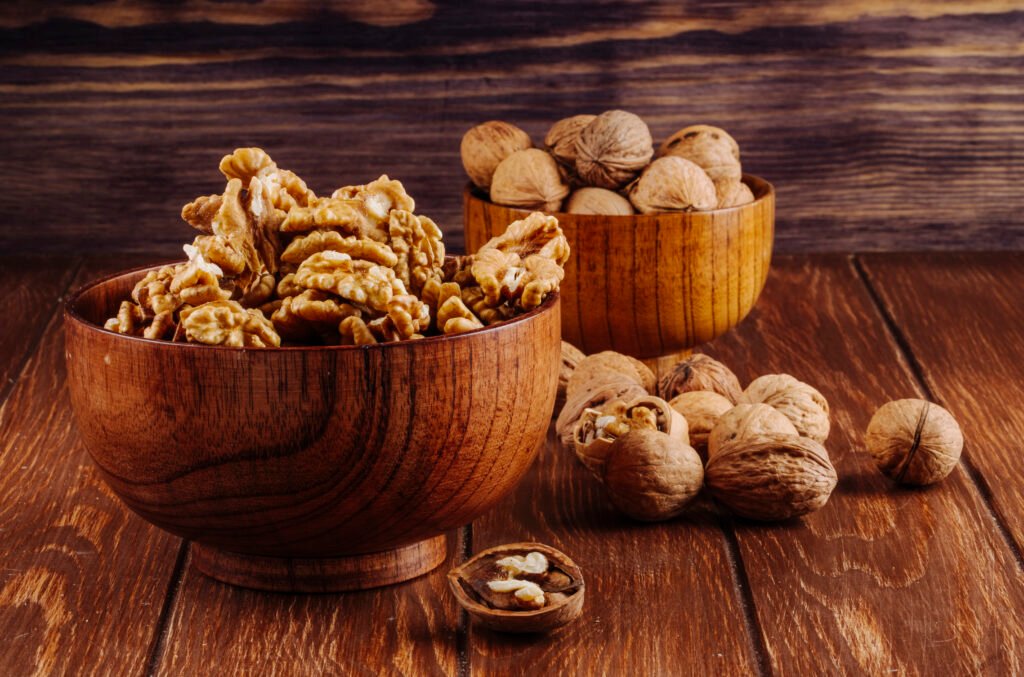Welcome to the world of walnuts! It is amazing how such a humble kind of nuts have such important nutrition and health affects. In this guide, we shall enlighten you on what walnuts are and why you should consider include them in your diet .

What Are Walnuts?
Walnuts are packed with important nutrients such as omega-3 fats, antioxidants and many other compounds that could help in protecting you from cognitive decline, heart diseases and cancer.
Walnut is not only a tasty component in many recipes or a healthy snack. Walnuts are high in polyunsaturated fat, which is a good/healthy fat that helps heart health and additionally provides a wide range of other benefits.
The English Walnut which can be bought in stores is also known as the Persian Walnut. This type of walnut is thought to have originated in Persia and then was cultivated throughout Asia and Europe .
History of Walnuts

Walnuts have been consumed for a long time, with their history going back thousands of years. In fact, they have been recognized as the “oldest tree food known to man” since 7000 B.C.. The Romans called them Juglans regia, meaning “Jupiter’s royal acorn” . It is also reported that the source of English walnuts is ancient Persia, where it was consumed by the rich population.
Walnut Nutrition Facts
Walnuts are little powerhouses of nutrition. They are filled with omga-3 fatty acids, protein, vitamins and minerals, and healthy portion of fiber thus providing you with a complete nutritional boost. Beyond that, the low carb content makes them the perfect choice for a variety of dietary patterns. Walnuts of protein as well have a high content.
Protein : Protein is necessary for the growth, regeneration, and repair of body tissues which is found in walnuts.
Omega-3 fatty acids : Walnuts contains a considerable quantity of alpha-linolenic acid , a type of omega-3 fatty acid that improves cardiovascular health and brain performance.
Folate (Vitamin B9) : Walnuts are high in folate, a critical vitamin B that is vital for DNA synthesis and red blood cell production.
Dietary fiber : In addition to the above nutrients, walnuts have a significant amount of dietary fiber. This is instrumental to the digestive health offered weight management benefits.
Magnesium : Walnuts are rich in magnesium, magnesium is a vital mineral in maintaining muscle and nerve function as well as supporting bone health .
Antioxidants : Moreover, walnuts have antioxidants such as polyphenols and melatonin that help to protect the body’s cells from damaging inflammation and oxidative stress .

Calories : The major calories walnuts contain comprise it of healthy fats per each serving amounting to approximately 183 grams.
Other Plant Compounds :
Walnuts are sources to a diverse mixture of bioactive plant compounds. Many of these compounds are rich in antioxidants; the majority of the antioxidants lie under the brown skin.
The plant compounds include:
- Ellagic acid : Antioxidant found in abundance in walnuts, which is coupled with ellagitannins and others in the same family . Its regular intake can reduce the risk of developing heart disease and cancer.
- Melatonin : Neuro-hormone, which is essential in the regulation of your circadian rhythm . Also, this compound has antioxidant effects and, when used regularly, can reduce the chance of developing heart disease.
- Phytic acid : This powerful antioxidant, otherwise known as phytate, but also known antioxidant, on the contrary, can disrupt the absorption of zinc and, mainly, iron from the same meal. This influence manifests itself only for people who eat a pair of products in the diet.
Let me surprise you – taking it is easier than it seems. Just sprinkle them on your salads or add them to oatmeal, put in a smoothie, or enjoy them for a snack.
Health benefits of Walnuts
This walnutsis also related to several health benefits. It is due to the fact that walnuts also promote a lower likelihood of contracting heart disease and developing cancer, as well as increase intelligence. These include:
Heart Health : Walnuts are a good partner for heart health. The so-called healthy fats and antioxidants are greasy. It lowers cholesterol levels and lowers the risk of developing heart disease.
Brain Boost : Omega-3 fatty acids, which are found in walnuts, are also said to have potential for the improvement of brain health, including memory and cognition .
Weight Management : Walnuts also contribute to managing fat, aiding in weight loss, in addition to being high in calories. This item contains protein, fiber, and healthy fats, which can satisfy one’s hunger and prevent cravings for more food.
Antioxidant Power : Walnuts have amazing antioxidant power, eliminating dangerous free radicals and protecting your cells from damage. This impressive antioxidant strength has a major impact on your holistic well-being and might potentially reduce the risk of chronic disease.
Blood Sugar Control : Healthy blood sugar levels are essential. The good news is that walnuts may help you stay healthy on the inside by enhancing insulin sensitivity and glucose metabolism.
Anti-Inflammatory Effects :
Walnuts have such an anti-inflammatory influence, and they may be a component of a skin anti-inflammatory diet to help alleviate inflammation and achieve better health.

It is not difficult to find ways to include nuts with walnuts when cooking or snacking on the go. Instead of making items difficult, you might simply sprinkle these on salads, mix them into oatmeal, incorporate them into smoothies, or simply enjoy some as a quick snack.
Read more – What is Disease X and Why is it in the news?
Frequently Asked Questions
Are Walnuts high in calories ?
Yes, walnuts are high-calorie, not for the reason that they are fatty, but that fats are good for health ones. And yet a lot of protein and fiber, which creates a feeling of fullness and satiety with a smaller number of the walnuts consumed . therefore, walnuts are useful for health
Can walnuts help with weight loss?
Walnuts, with their excessive calories, may help with weight loss in small portions . Walnuts particular mix of protein, fiber, and nutrient fats beautifully reduces hunger and provides a primary sense of fullness, making it possible to limit calories eaten and probably lose weight.
How many walnuts should I eat per day?
The recommended portion is about one ounce, which is approximately equal to a small handful or 14 halves. Therefore, the number of nutrients will be well-balanced, and the calorie rate will not be exceeded.
Are there different types of walnuts?
Yes, there are different types of walnuts, such as English walnuts, which are the most common, black walnuts, as well as white walnuts, also called butternuts . Each of them may have a special taste and nutritional content.
Are there any potential side effects of eating walnuts?
Consumption of the walnuts, while not entirely detrimental to health, may lead to various conditions such as gastric disturbances from over-consumption of fibers and the upset stomach . Additionally, individuals with a nut hypnogenesis should avoid consuming them or receive consultancy from a health officer before including the nuts in their diet.
Do walnuts need to be soaked or activated before eating?
However, the practice of soaking or germinating walnuts is not always used by all people, if a person has soaked them in water for the night, and then has dried them, then this is his choice. Soaked nuts can be consumed because in this case, the phytic acid can be less, but if it is present, it is up to the person’s decision.





















Pingback: Broccoli Vs Cauliflower